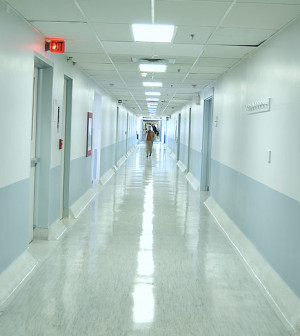- Could Your Grocery Store Meat Be Causing Recurring UTIs?
- Are You Making This Expensive Thermostat Error This Winter?
- Recognizing the Signs of Hypothyroidism
- 10 Strategies to Overcome Insomnia
- Could Artificial Sweeteners Be Aging the Brain Faster?
- Techniques for Soothing Your Nervous System
- Does the Water in Your House Smell Funny? Here’s Why
- Can a Daily Dose of Apple Cider Vinegar Actually Aid Weight Loss?
- 6 Health Beverages That Can Actually Spike Your Blood Sugar
- Treatment Options for Social Anxiety Disorder
Health Highlights: Dec. 4, 2014


Here are some of the latest health and medical news developments, compiled by the editors of HealthDay:
Treatment-Resistant Infections Among Newborns in India Pose Worldwide Threat
Antibiotic-resistant bacterial infections are killing tens of thousands of babies in India each year and could become a global health threat, a new study says.
Last year, more than 58,000 infants in India died of these resistant infections. That’s only a small portion of the nearly 800,000 newborns who die each year in India, but doctors say the rising number of deaths from resistant infections could eventually defeat efforts to improve the country’s infant death rate, The New York Times reported.
India accounts for nearly one-third of newborn deaths worldwide.
“Reducing newborn deaths in India is one of the most important public health priorities in the world, and this will require treating an increasing number of neonates who have sepsis and pneumonia,” said study leader Dr. Vinod Paul, chief of pediatrics at the All India Institute of Medical Sciences, The Times reported.
“But if resistant infections keep growing, that progress could slow, stop or even reverse itself. And that would be a disaster for not only India but the entire world,” Paul added.
“Five years ago, we almost never saw these kinds of infections,” Dr. Neelam Kler, chairwoman of the department of neonatology at Sir Ganga Ram Hospital, an upscale private hospital in New Delhi, told The Times.
“Now, close to 100 percent of the babies referred to us have multidrug resistant infections. It’s scary,” Kler added.
An ongoing study at several government-run hospitals in Delhi has found that 70 percent of infections in more than 12,000 high-risk newborns were immune to a number of powerful antibiotics, The Times reported.
There is extensive evidence that a large amount of bacteria in India’s water, sewage, animals, soil and even mothers are immune to nearly all antibiotics, according to a number of scientists.
These resistant bacteria are especially dangerous to newborns because their immune systems are weak, The Times reported.
The “superbugs” have started to spread to other countries, researchers warn.
“India’s dreadful sanitation, uncontrolled use of antibiotics and overcrowding coupled with a complete lack of monitoring the problem has created a tsunami of antibiotic resistance that is reaching just about every country in the world,” Dr. Timothy Walsh, a professor of microbiology at Cardiff University in the U.K., told The Times.
Resistant bacteria that originated in India have already been confirmed in a number of countries, including the United States, France, Japan and Oman.
—–
U.S. Health Care Worker Arriving From West Africa May Have Ebola
An American health care worker who may be infected with Ebola is being flown from West Africa to the U.S. and will be taken to Emory University Hospital in Atlanta.
The hospital has a special isolation unit that was used for four of the 10 Ebola patients previously treated in the U.S. Six of those 10 were Americans infected while providing care in Ebola-stricken countries in West Africa, the Associated Press reported.
No details about the health care worker were released, and a hospital spokeswoman did not say why the patient was being evacuated from West Africa even before Ebola infection was confirmed.
Citing privacy considerations, a U.S. State Department official refused to comment on the case, the AP reported.
—–
Copyright © 2026 HealthDay. All rights reserved.










